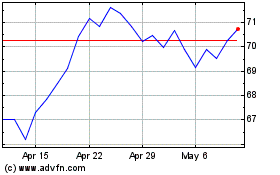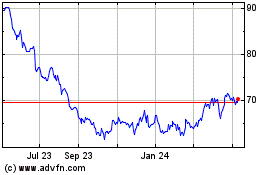General Mills Offers Gloomy Outlook -- WSJ
December 21 2016 - 3:03AM
Dow Jones News
Food giant struggles to win back customers as its sales fall
short of expectations
By Annie Gasparro
General Mills Inc. projected a grim outlook for the year, as it
struggles to win back customers who have dropped traditional,
processed foods like its Yoplait yogurt for more natural
alternatives.
Faltering sales of yogurt, Progresso soup and Pillsbury dough in
the U.S. pushed the food giant's second-quarter profit down 9%, it
said on Tuesday. It expects comparable sales for the year ending in
May to decline 3% to 4%, down from an earlier estimate of no more
than a 2% drop. Shares fell 3.4% in recent trading.
Chief Executive Ken Powell said General Mills' advertising
wasn't adequate, and it didn't come out with enough new products,
causing its sales to fall short of expectations.
Executives at the Minneapolis-based company said the industry
remains challenging, as U.S. food and beverage sales growth has
steadily eroded over the past five quarters. Industry analysts say
that suggests people are eating out at restaurants more.
Lower food costs and savings from consolidating factories and
corporate restructurings have helped General Mills and its peers
deliver impressive earnings despite softening sales for a while,
but now "sales declines are simply too much for cost savings" to
offset, according to RBC Capital Markets analyst David Palmer.
In the most recent period, General Mills' comparable U.S. retail
sales fell 6%, a steeper drop than the 0.6% seen industrywide.
Chief Operating Officer Jeff Harmening, whom insiders see as Mr.
Powell's likely successor as soon as next year, is tasked with
reviving sales.
Mr. Harmening has been focusing on yogurt, hoping that combining
Greek yogurt with "dippable" pretzels and oat bites, and making
more organic yogurt will turn around the business. U.S. retail
sales in the yogurt segment plunged 18% in the most recent
quarter.
General Mills' last major project involved removing synthetic
dyes and artificial flavors from cereals such as Trix and Cheerios,
but U.S. retail sales of cereal fell 3% during the quarter. It also
continues to focus on improving its profitability through several
cost-cutting efforts that have resulted in announced layoffs of
more than 5,500 employees, or roughly 10% of its workforce, since
mid-2014.
General Mills could benefit in the short term through corporate
tax changes if President-elect Donald Trump lowers the tax rate,
but that is still uncertain, Mr. Powell said.
"That would be a positive for us...we just have to see how it
unfolds," Mr. Powell said in an interview. From infrastructure
investments to reduced regulation, "it's really impossible to
predict how or whether they would have an impact on the consumer
food business," he added.
For the quarter ended Nov. 27, General Mills reported a profit
of $481.8 million, or 80 cents a share, down from $529.5 million,
or 87 cents a share, a year earlier.
Adjusted to exclude the divestiture of its Green Giant business
and other items, General Mills earned 85 cents a share in the
most-recent quarter.
Revenue dropped 7.1% to $4.11 billion.
--Imani Moise contributed to this article.
Write to Annie Gasparro at annie.gasparro@wsj.com
(END) Dow Jones Newswires
December 21, 2016 02:48 ET (07:48 GMT)
Copyright (c) 2016 Dow Jones & Company, Inc.
General Mills (NYSE:GIS)
Historical Stock Chart
From Mar 2024 to Apr 2024

General Mills (NYSE:GIS)
Historical Stock Chart
From Apr 2023 to Apr 2024
